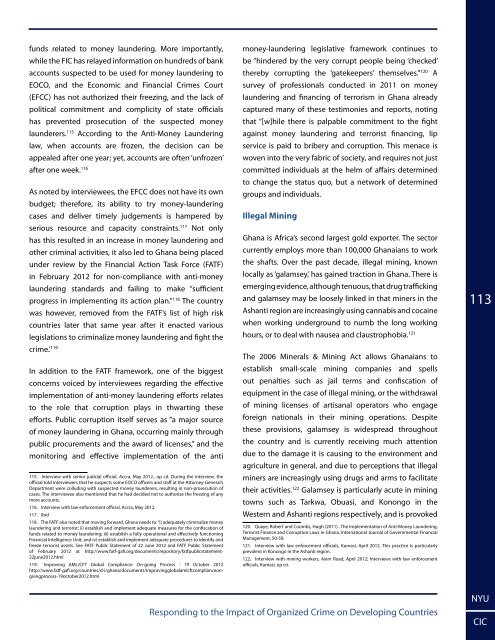here - Center on International Cooperation - New York University
here - Center on International Cooperation - New York University
here - Center on International Cooperation - New York University
Create successful ePaper yourself
Turn your PDF publications into a flip-book with our unique Google optimized e-Paper software.
funds related to m<strong>on</strong>ey laundering. More importantly,<br />
while the FIC has relayed informati<strong>on</strong> <strong>on</strong> hundreds of bank<br />
accounts suspected to be used for m<strong>on</strong>ey laundering to<br />
EOCO, and the Ec<strong>on</strong>omic and Financial Crimes Court<br />
(EFCC) has not authorized their freezing, and the lack of<br />
political commitment and complicity of state officials<br />
has prevented prosecuti<strong>on</strong> of the suspected m<strong>on</strong>ey<br />
launderers. 115 According to the Anti-M<strong>on</strong>ey Laundering<br />
law, when accounts are frozen, the decisi<strong>on</strong> can be<br />
appealed after <strong>on</strong>e year; yet, accounts are often ‘unfrozen’<br />
after <strong>on</strong>e week. 116<br />
As noted by interviewees, the EFCC does not have its own<br />
budget; t<str<strong>on</strong>g>here</str<strong>on</strong>g>fore, its ability to try m<strong>on</strong>ey-laundering<br />
cases and deliver timely judgements is hampered by<br />
serious resource and capacity c<strong>on</strong>straints. 117 Not <strong>on</strong>ly<br />
has this resulted in an increase in m<strong>on</strong>ey laundering and<br />
other criminal activities, it also led to Ghana being placed<br />
under review by the Financial Acti<strong>on</strong> Task Force (FATF)<br />
in February 2012 for n<strong>on</strong>-compliance with anti-m<strong>on</strong>ey<br />
laundering standards and failing to make “sufficient<br />
progress in implementing its acti<strong>on</strong> plan.” 118 The country<br />
was however, removed from the FATF’s list of high risk<br />
countries later that same year after it enacted various<br />
legislati<strong>on</strong>s to criminalize m<strong>on</strong>ey laundering and fight the<br />
crime.’ 119<br />
In additi<strong>on</strong> to the FATF framework, <strong>on</strong>e of the biggest<br />
c<strong>on</strong>cerns voiced by interviewees regarding the effective<br />
implementati<strong>on</strong> of anti-m<strong>on</strong>ey laundering efforts relates<br />
to the role that corrupti<strong>on</strong> plays in thwarting these<br />
efforts. Public corrupti<strong>on</strong> itself serves as “a major source<br />
of m<strong>on</strong>ey laundering in Ghana, occurring mainly through<br />
public procurements and the award of licenses,” and the<br />
m<strong>on</strong>itoring and effective implementati<strong>on</strong> of the anti<br />
115. Interview with senior judicial official, Accra, May 2012., op cit. During the interview, the<br />
official told interviewers that he suspects some EOCO officers and staff at the Attorney-General’s<br />
Department were colluding with suspected m<strong>on</strong>ey launderers, resulting in n<strong>on</strong>-prosecuti<strong>on</strong> of<br />
cases. The interviewee also menti<strong>on</strong>ed that he had decided not to authorize the freezing of any<br />
more accounts.<br />
116. Interview with law enforcement official, Accra, May 2012.<br />
117. Ibid<br />
118. The FATF also noted that moving forward, Ghana needs to: “i) adequately criminalize m<strong>on</strong>ey<br />
laundering and terrorist; ii) establish and implement adequate measures for the c<strong>on</strong>fiscati<strong>on</strong> of<br />
funds related to m<strong>on</strong>ey laundering; iii) establish a fully operati<strong>on</strong>al and effectively functi<strong>on</strong>ing<br />
Financial Intelligence Unit; and iv) establish and implement adequate procedures to identify and<br />
freeze terrorist assets. See FATF Public Statement of 22 June 2012 and FATF Public Statement<br />
of February 2012 at http://www.fatf-gafi.org/documents/repository/fatfpublicstatement-<br />
22june2012.html<br />
119. Improving AML/CFT Global Compliance: On-going Process - 19 October 2012<br />
http://www.fatf-gafi.org/countries/d-i/ghana/documents/improvingglobalamlcftcompliance<strong>on</strong>goingprocess-19october2012.html<br />
m<strong>on</strong>ey-laundering legislative framework c<strong>on</strong>tinues to<br />
be “hindered by the very corrupt people being ‘checked’<br />
t<str<strong>on</strong>g>here</str<strong>on</strong>g>by corrupting the ‘gatekeepers’ themselves.” 120 A<br />
survey of professi<strong>on</strong>als c<strong>on</strong>ducted in 2011 <strong>on</strong> m<strong>on</strong>ey<br />
laundering and financing of terrorism in Ghana already<br />
captured many of these testim<strong>on</strong>ies and reports, noting<br />
that “[w]hile t<str<strong>on</strong>g>here</str<strong>on</strong>g> is palpable commitment to the fight<br />
against m<strong>on</strong>ey laundering and terrorist financing, lip<br />
service is paid to bribery and corrupti<strong>on</strong>. This menace is<br />
woven into the very fabric of society, and requires not just<br />
committed individuals at the helm of affairs determined<br />
to change the status quo, but a network of determined<br />
groups and individuals.<br />
Illegal Mining<br />
Ghana is Africa’s sec<strong>on</strong>d largest gold exporter. The sector<br />
currently employs more than 100,000 Ghanaians to work<br />
the shafts. Over the past decade, illegal mining, known<br />
locally as ‘galamsey,’ has gained tracti<strong>on</strong> in Ghana. T<str<strong>on</strong>g>here</str<strong>on</strong>g> is<br />
emerging evidence, although tenuous, that drug trafficking<br />
and galamsey may be loosely linked in that miners in the<br />
Ashanti regi<strong>on</strong> are increasingly using cannabis and cocaine<br />
when working underground to numb the l<strong>on</strong>g working<br />
hours, or to deal with nausea and claustrophobia. 121<br />
The 2006 Minerals & Mining Act allows Ghanaians to<br />
establish small-scale mining companies and spells<br />
out penalties such as jail terms and c<strong>on</strong>fiscati<strong>on</strong> of<br />
equipment in the case of illegal mining, or the withdrawal<br />
of mining licenses of artisanal operators who engage<br />
foreign nati<strong>on</strong>als in their mining operati<strong>on</strong>s. Despite<br />
these provisi<strong>on</strong>s, galamsey is widespread throughout<br />
the country and is currently receiving much attenti<strong>on</strong><br />
due to the damage it is causing to the envir<strong>on</strong>ment and<br />
agriculture in general, and due to percepti<strong>on</strong>s that illegal<br />
miners are increasingly using drugs and arms to facilitate<br />
their activities. 122 Galamsey is particularly acute in mining<br />
towns such as Tarkwa, Obuasi, and K<strong>on</strong><strong>on</strong>go in the<br />
Western and Ashanti regi<strong>on</strong>s respectively, and is provoked<br />
120. Quaye, Robert and Coombs, Hugh (2011).. The Implementati<strong>on</strong> of Anti-M<strong>on</strong>ey Laundering,<br />
Terrorist Finance and Corrupti<strong>on</strong> Laws in Ghana, Internati<strong>on</strong>al Journal of Governmental Financial<br />
Management, 50-59.<br />
121. Interview with law enforcement officials, Kumasi, April 2012. This practice is particularly<br />
prevalent in K<strong>on</strong><strong>on</strong>go in the Ashanti regi<strong>on</strong>.<br />
122. Interview with mining workers, Axim Road, April 2012; Interviews with law enforcement<br />
officials, Kumasi, op cit.<br />
113<br />
Resp<strong>on</strong>ding to the Impact of Organized Crime <strong>on</strong> Developing Countries<br />
NYU<br />
CIC
















